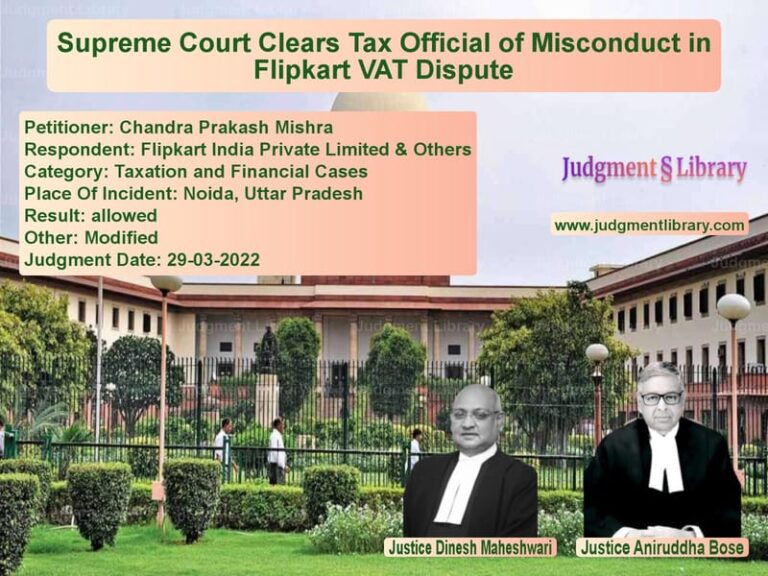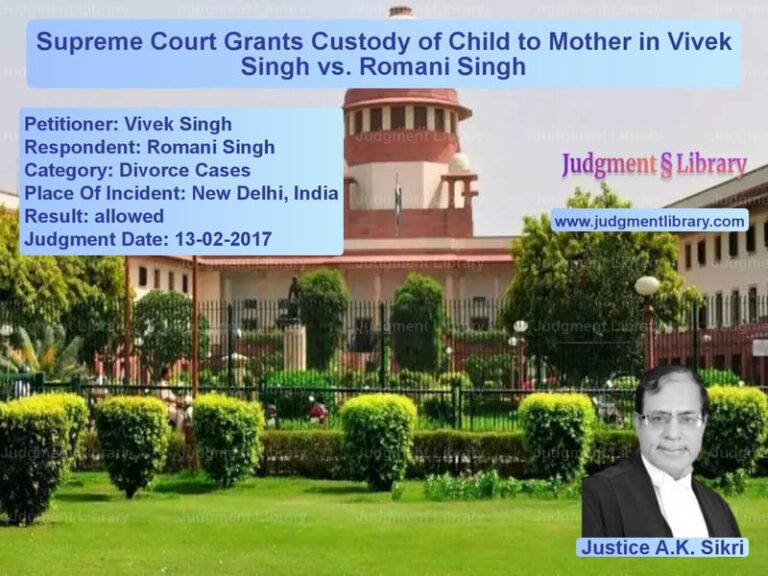Service Tax Exemption and Job Work: Supreme Court Ruling on Contract Labour Agreements
The case of Adiraj Manpower Services Pvt. Ltd. vs. Commissioner of Central Excise Pune II revolves around the applicability of service tax exemption under Notification No. 25/2012-Service Tax dated 20 June 2012. The key issue was whether the appellant’s contractual work qualified as job work, making it eligible for exemption, or if it was merely a contract for manpower supply, attracting service tax liability.
The Supreme Court examined the nature of the agreement between the appellant and its client, Sigma Electric Manufacturing Corporation Pvt. Ltd., and ruled against the appellant, confirming that the contract was for manpower supply rather than job work. This ruling has significant implications for businesses relying on contract labor services.
Background of the Case
The appellant, Adiraj Manpower Services Pvt. Ltd., obtained service tax registration under the category of ‘Manpower Recruitment or Supply Agency Service’. On 1st January 2012, it entered into an agreement with Sigma Electric to provide personnel for activities such as felting, material handling, pouring, and supply of materials to a furnace.
On 26th September 2014, a show cause notice was issued by the Commissioner of Central Excise, demanding service tax of ₹10,50,23,672 along with interest and penalties. The allegations included:
- Failure to pay service tax on time for the period from April 2012 to March 2014.
- Failure to assess and discharge service tax liability correctly.
- Suppression of taxable value and incorrect filing of ST-3 returns.
The appellant argued that its activities qualified as ‘job work’ under Notification No. 25/2012-Service Tax, which exempts intermediate production processes. The Commissioner rejected this claim, holding that the appellant was engaged in manpower supply rather than job work. The Customs, Excise & Service Tax Appellate Tribunal (CESTAT) upheld this decision, leading to the present appeal before the Supreme Court.
Legal Dispute Over Service Tax Exemption
The core issue was whether the appellant’s contract with Sigma was for manpower supply or job work, as the latter qualifies for tax exemption under Notification No. 25/2012-Service Tax.
Relevant Legal Provisions
- Notification No. 25/2012-Service Tax: Grants tax exemption for carrying out an intermediate production process as job work in relation to goods on which duty is payable by the principal manufacturer.
- Contract Labour (Regulation and Abolition) Act, 1970 (CLRA): Defines a contractor as someone who either supplies manpower or produces a given result for an establishment.
Arguments Before the Supreme Court
Appellant’s Arguments
The appellant, represented by senior counsel, contended:
- The contract was for job work, not manpower supply, as it required skilled personnel to perform specific tasks such as material handling and painting.
- The company had discretion in selecting workers and supervising them, indicating an independent contractor-client relationship.
- Invoices were based on work done, not on the number of workers supplied, which aligns with job work.
- Precedents such as Om Enterprises v. Commissioner of Central Excise, Pune-I and Bhagyashree Enterprises v. Commissioner support that contracts based on piece rate work should be treated as job work.
Respondent’s Arguments
The Additional Solicitor General, representing the tax department, argued:
- The agreements lacked essential features of job work, such as process specifications and quality control.
- The agreements primarily governed workforce management, indicating a manpower supply arrangement.
- The invoices did not include elements typically found in job work agreements, such as specifications on work deliverables.
- The appellant’s attempt to classify the service as job work was aimed at avoiding tax liability.
Supreme Court’s Judgment
The Supreme Court ruled against the appellant, affirming that the contract was for manpower supply and not job work. The key findings were:
- The contract primarily regulated workforce supply rather than specifying job work deliverables.
- There was no mention of production processes, quality control, or work output in the agreements.
- The appellant did not register under ‘Business Auxiliary Services’ or claim the exemption under the correct category.
- The attempt to classify manpower supply as job work was an attempt to evade tax.
The Supreme Court observed:
“The agreement, when read as a composite whole, clearly establishes that the contract is for manpower supply. The absence of job work specifications indicates that it does not qualify for the tax exemption.”
Key Observations from the Judgment
- Manpower supply contracts cannot be misclassified as job work to avail tax exemptions.
- For an agreement to qualify as job work, it must specify production details, quality standards, and delivery terms.
- Employers must differentiate between contract labor and job work arrangements when drafting agreements.
- The decision reinforces the government’s stance against tax evasion through misclassification of services.
Impact of the Judgment
This judgment has far-reaching consequences for industries relying on contract labor:
- For Businesses: Companies must ensure that job work contracts clearly define production responsibilities to qualify for tax exemptions.
- For Service Providers: Firms engaged in manpower supply must register under the correct tax category and comply with service tax requirements.
- For Tax Authorities: The ruling strengthens their ability to challenge incorrect tax exemption claims and enforce compliance.
- For Legal Precedents: The judgment sets a clear benchmark for distinguishing job work from manpower supply.
Conclusion
The Supreme Court’s decision in Adiraj Manpower Services Pvt. Ltd. vs. Commissioner of Central Excise Pune II reinforces the principle that tax exemptions must be interpreted strictly and cannot be claimed through misclassification. By ruling that the appellant’s contract was for manpower supply, the judgment provides clarity on the distinction between job work and contract labor.
This ruling serves as a warning to businesses that misrepresenting contracts to evade tax obligations will not be tolerated. It also emphasizes the importance of transparency and proper documentation in contractual agreements to ensure compliance with tax laws.
Petitioner Name: Adiraj Manpower Services Pvt. Ltd..Respondent Name: Commissioner of Central Excise Pune II.Judgment By: Justice Dhananjaya Y Chandrachud, Justice Surya Kant.Place Of Incident: Pune, Maharashtra.Judgment Date: 18-02-2022.
Don’t miss out on the full details! Download the complete judgment in PDF format below and gain valuable insights instantly!
Download Judgment: adiraj-manpower-serv-vs-commissioner-of-cent-supreme-court-of-india-judgment-dated-18-02-2022.pdf
Directly Download Judgment: Directly download this Judgment
See all petitions in Income Tax Disputes
See all petitions in Tax Evasion Cases
See all petitions in Judgment by Dhananjaya Y Chandrachud
See all petitions in Judgment by Surya Kant
See all petitions in dismissed
See all petitions in supreme court of India judgments February 2022
See all petitions in 2022 judgments
See all posts in Taxation and Financial Cases Category
See all allowed petitions in Taxation and Financial Cases Category
See all Dismissed petitions in Taxation and Financial Cases Category
See all partially allowed petitions in Taxation and Financial Cases Category







